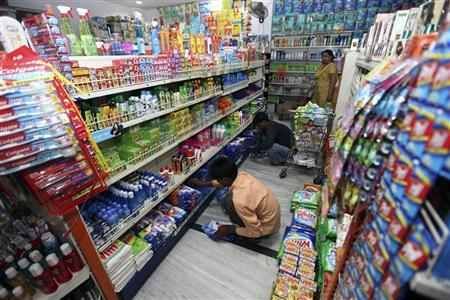 | « Back to article | Print this article |
Counterfeit consumer goods growing faster than overall market, says KPMG-Ficci study.
 Walk down the public bridge of any local railway station here or any other city for that matter and it is not uncommon to find popular consumer products available dirt cheap.
Walk down the public bridge of any local railway station here or any other city for that matter and it is not uncommon to find popular consumer products available dirt cheap.
But before you rush to make a purchase, consider it might be a fake.
Despite the war mounted by fast-moving consumer goods (FMCG) companies on counterfeiting, the menace hardly seems to have abated.
A recent study by advisory firm KPMG and the Federation of Indian Chambers of Commerce and Industry (Ficci) shows sales of fake consumer goods are growing faster than the overall consumer products market.
Counterfeit and smuggled products now account for more than a fifth of the FMCG market.
This is based on the Ficci-KPMG report's assessment that the FMCG counterfeit market at the end of 2014 stood at 65 per cent of the total market of counterfeit products, which was worth Rs 1.05 lakh crore.
The FMCG counterfeit market, as such, stood at Rs 68,000 crore (Rs 680 billion) at the end of 2014. And, this market would have grown in 2015, according to industry estimates.
At the end of 2014, the overall FMCG market in India was valued at Rs 3.2 lakh crore. This market hasn't dramatically changed this year, given the slowdown, notably in urban areas.
Over a fifth of FMCG products in India are fake or smuggled The forecast, according to Rajat Wahi, partner and head (consumer markets), KPMG India, is that the overall FMCG market will grow 11-12 per cent a year through the next four years. However, the counterfeit market is expected to see sharper growth as law enforcement remains weak and fraudsters look to make inroads into the market, riding on cheap products.
"In a megapolis such as Mumbai, cases of counterfeiting reported are negligible," says D Sivanandan, former director-general of police, Maharashtra, who now runs a city-based consultancy that advises firms on counterfeiting. "I cannot imagine what the situation is like in small towns and cities, where monitoring levels are lower," he says.
The Ficci-KPMG report says counterfeiting is rampant in "urban areas", basically rural areas and small towns and cities. It adds small retailers not in the wholesale supply chain join the counterfeit market.
FMCG companies say they are working closely with law enforcement authorities to bring fraudsters to task. Hindustan Unilever, Godrej Consumer, Dabur and Emami say they engage with the police and government at regular intervals to conduct raids and seizures.
"Counterfeiting is something we take very seriously, since any pass-off or fake of our product is a loss of business for us," says Sunil Duggal, chief executive officer, Dabur India.
Some of Dabur's brands that have been copied in the past include Dabur Gulabari, Dabur Lal Danth Manjan and Dabur Amla Hair Oil. The firm, says Duggal, carefully maps areas where spurious products are made and informs the police of these.
Executives from companies such as Emami say they have a separate cell headed by an ex-assistant commissioner of police whose job is to investigate leads provided by the in-house sales force on places where counterfeit products of its popular brands are made. Once these are identified, the team and local authorities raid these factories.
Some firms also work with private detectives. But is that enough? The Ficci-KPMG report says the loss to the exchequer as a result of FMCG counterfeiting is to the tune of Rs 27,500 crore (Rs 275 billion).
Apart from the lack of coordination between law enforcement authorities, which companies say is a challenge, experts also point to the lack of awareness among consumers.
Wahi of KPMG says there is deceptive counterfeiting and non-deceptive counterfeiting.
In the former, consumers unknowingly purchase fakes, while in the latter, consumers knowingly do so to trim costs.